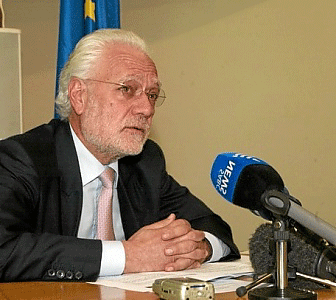
BY OUR STAFF THE European Union (EU) head of delegation, Ambassador Aldo Dell’Ariccia has said the bloc was scaling down on its humanitarian assistance to Zimbabwe because of the reduced disaster situation in the country. He however said the bloc would remain committed to providing emergency relief whenever the need arises. Dell’Ariccia told The Standard that the EU’s Humanitarian Aid and Civil Protection department (Echo) had for the past 10 years channelled over 180 million euros in response to Zimbabwe’s emergency relief needs such as the recent typhoid outbreak. However, he said, the bloc was now of the view that the country was no longer in a situation of humanitarian emergency. “Our focus is now on a long-term approach which is aimed at fighting the causes that provoke possibilities of emergencies,” he said. Dell’Ariccia said the EU was channelling its aid through United Nations agencies and NGOs and recently provided US$6 million to the Food and Agriculture Organisation to implement a programme meant to improve the food security situation in the country. He said since the formation of the coalition government in 2009, the EU and member states have provided over US$1 billion in development assistance to Zimbabwe. Dell’Ariccia said with effect from the 23rd of last month, the Zimbabwe government now qualified to get direct funding from the EU. He said this followed the European Council’s decision to suspend measures in Article 96 of the Cotonou Agreement between the EU and countries of the African Caribbean and Pacific (ACP) group which prohibited the bloc from channelling aid through the government of Zimbabwe. But the EU head of delegation said funding for next year and 2013 was already committed, meaning that the Zimbabwe government would only benefit from a new cycle of cooperation which starts in 2014. Since 2009, the EU development assistance has been channelled to projects such as those meant to improve access to water and sanitation for more than six million people. It has also assisted in the provision of medicines, health personnel and printing and distribution of 22 million textbooks to both primary and secondary schools. The bloc has also supported 700 000 small-scale farmers to improve productivity and sustainability in agriculture. Meanwhile, European Commissioner for International Cooperation, Humanitarian Aid and Crisis Response, Kristalina Georgieva has expressed concern at the increased attacks on humanitarian workers across the globe. In a statement marking today’s World Humanitarian Day, Georgieva said attacks on humanitarian posts have tripled in the last decade, with 109 humanitarian workers having been killed, while 143 others were wounded and 132 have been kidnapped since last year. She said the overwhelming majority of the victims were not international aid workers from Western countries but those serving in their own country, working closest to the local population. “Humanitarian aid is not the preserve of the West but a global imperative. The many national aid workers who have made the ultimate sacrifice bear witness to this,” said Georgieva.










